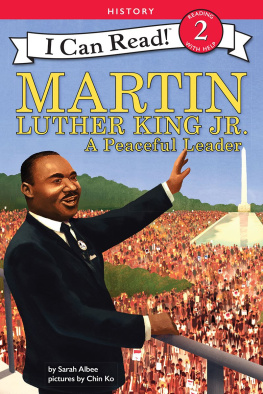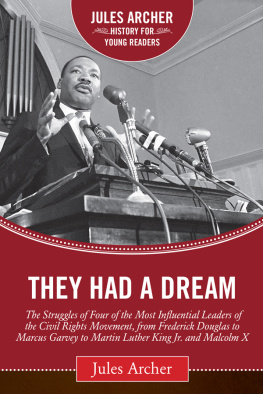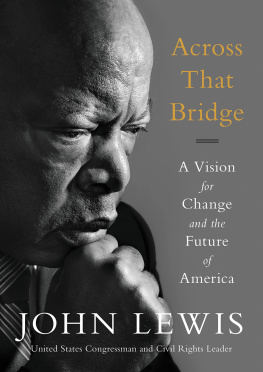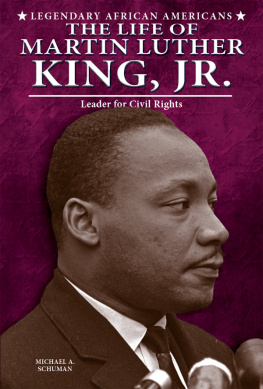Publication of this volume was made possible in part
by a grant from the National Endowment for the Humanities.
Copyright 1998 by Dennis C. Dickerson
Published by The University Press of Kentucky
Scholarly publisher for the Commonwealth,
serving Bellarmine University, Berea College, Centre
College of Kentucky, Eastern Kentucky University,
The Filson Historical Society, Georgetown College,
Kentucky Historical Society, Kentucky State University,
Morehead State University, Murray State University,
Northern Kentucky University, Transylvania University,
University of Kentucky, University of Louisville,
and Western Kentucky University.
All rights reserved.
Editorial and Sales Offices: The University Press of Kentucky
663 South Limestone Street, Lexington, Kentucky 40508-4008
www.kentuckypress.com
Library of Congress Cataloging-in-Publication Data
Dickerson, Dennis C., 1949
Militant mediatorWhitney M. Young, Jr. / Dennis C. Dickerson.
p. cm.
Includes bibliographical references and index.
ISBN-10: 0-8131-2058-6 (acid-free paper)
ISBN-10: 0-8131-9081-9 (pbk)
1. Young, Whitney M. 2. Afro-American civil rights workersBiography.
3. Civil rights workersUnited StatesBiography. 4. Afro-Americans
Biography. 5. National Urban LeagueBiography. I. Title
E185.97.Y635D53 1998
323.092dc21
[B]97-43456
ISBN-13: 978-0-8131-9081-5 (pbk)
This book is printed on acid-free recycled paper meeting the requirements of the American National Standard for Permanence of Paper for Printed Library Materials.
Manufactured in the United States of America
| Member of the Association of
American University Presses |
Acknowledgments
My awareness of Whitney M. Young Jr. began fortuitously at my brother Charless 1965 graduation from Lincoln University in Pennsylvania. As Mr. Young, the commencement speaker, marched in the procession I inadvertently took his picture while taking several shots of my brother. When I undertook to research and write this book, Charles, who had been my history professor, strongly encouraged me but did not live to see this project completed. My debt to him is only one of many that I have accumulated.
Generous financial support has come from a Chairmans Special Fellowship from the National Endowment for the Humanities, a grant-in-aid from the American Council of Learned Societies, and an Albert J. Beveridge Grant for Research in American History from the American Historical Association. A Moody Grant from the Lyndon Baines Johnson Foundation enabled me to do research at the Lyndon Baines Johnson Presidential Library in Austin, Texas. The Rockefeller Foundation Research Fellowship Program for Minority Scholars supported a sabbatical from Williams College in 1983-84, and the Rockefeller Foundation Residency Fellowship Program in the Humanities allowed me to spend the 1987-88 academic year at the Carter G. Woodson Institute for Afro-American and African Studies at the University of Virginia. Other financial assistance at Williams College included grants from Division II research funds, from a Presidential Discretionary Fund, from the Named Chair Account, and a residency during the 1992 spring semester at the Center for the Humanities and Social Sciences. Dean of the Faculty David L. Smith expeditiously provided funds to reproduce photographs from the Rare Book and Manuscript Library at Columbia University. Rhodes College aided with Faculty Travel Funds.
Many librarians and archivists facilitated research at Williams College, Columbia University, Kentucky State University, the University of Louisville, the University of Massachusetts at Amherst, the University of Minnesota, the Atlanta University Center, Emory University, the John F. Kennedy Presidential Library, the Lyndon Baines Johnson Presidential Library, the Library of Congress Manuscript Division, the Federal Bureau of Investigation, the Minnesota Historical Society, the Martin Luther King Jr. Center for Nonviolent Social Change, the Rockefeller Archive Center, the Carnegie Corporation of New York, the Taconic Foundation, the Alfred P. Sloan Foundation, the Ford Foundation Archives, and the Great Plains Black Museum in Omaha, Nebraska. Arthur C. McCaw allowed me to examine his private papers. Leonard Garment gave me access to his personal papers at the Library of Congress Manuscript Division.
I extend my many thanks to colleagues who read all or part of the manuscript and shared perceptive and helpful comments. At Williams College they include Thomas Kohut, John M. Hyde, Frederick Rudolph, Russell H. Bostert, Charles B. Dew, David L. Smith, Alex Willingham, and Reginald Hildebrand, now at the University of North Carolina at Chapel Hill. I am also appreciative to James H. Cone of Union Theological Seminary in New York City, George C. Wright of the University of Texas at Arlington, Kenneth M. Hamilton of Southern Methodist University, and the late Armstead L. Robinson of the University of Virginia. A. Bernice Manns-Hutchinson also read early portions of the manuscript and gave me the benefit of her evaluation.
Georgia Swift, secretary of the Williams College Department of History, typed various versions of the manuscript. Donna Chenail, Shirley Bushika, Becky Brassard, and Peggy Weyers of the Williams Faculty Secretarial Office typed the final drafts. They performed these tasks punctually and efficiently. They have my thanks.
Mrs. Margaret B. Young, widow of Whitney M. Young Jr., granted me three formal interviews, shared her private papers, read the manuscript, and answered innumerable questions over the telephone and by mail. Dr. Marcia Young Cantarella and Mrs. Lauren Young Casteel, the daughters of Whitney and Margaret Young, also aided the research through my interviews with them. I am grateful for their assistance and respect for my scholarly independence.
My family has been unusually supportive through the several years of research and writing. My mother, Oswanna Dickerson, and my late father, Carl O. Dickerson, always cheered me on. My brothers Carl and James provided me with lodging during various research trips. My children, Nicole, Valerie, Christina, and Dennis Jr., always wanted to know about Whitney M. Young Jr. and why he was so important. My wife, Mary A.E. Dickerson, to whom this book is dedicated, extended to me her unwavering love, unstinting encouragement, and enormous patience. She tolerated my frequent absences when traveling to numerous repositories and my marathon work on this project. She made its completion possible. Only I, however, bear responsibility for any shortcomings my efforts may have produced.













